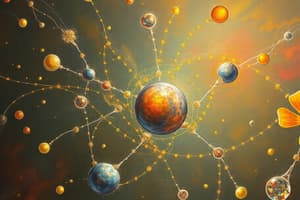Podcast
Questions and Answers
What defines the atomic number of an atom?
What defines the atomic number of an atom?
- Total number of subatomic particles
- Number of protons (correct)
- Number of electrons
- Number of protons and neutrons
How is the mass number of a given atom calculated?
How is the mass number of a given atom calculated?
- Protons - Neutrons
- Protons × Neutrons
- Protons + Neutrons (correct)
- Protons + Electrons
Which subatomic particle has a positive charge and is present in the nucleus of an atom?
Which subatomic particle has a positive charge and is present in the nucleus of an atom?
- Positron
- Proton (correct)
- Neutron
- Electron
What does the atomic number define for an element?
What does the atomic number define for an element?
Why is the mass number not automatically known based on the elemental identity?
Why is the mass number not automatically known based on the elemental identity?
What are isobars?
What are isobars?
How does atomic mass differ from mass number?
How does atomic mass differ from mass number?
Which subatomic particle resides in the nucleus of an atom?
Which subatomic particle resides in the nucleus of an atom?
What property of an atom determines its position on the periodic table?
What property of an atom determines its position on the periodic table?
How are isotopes of an element different from each other?
How are isotopes of an element different from each other?
Flashcards are hidden until you start studying
Study Notes
- Electrons travel in orbitals outside the atom nucleus, while neutrons and protons reside in the nucleus.
- Protons have a positive charge and an atomic mass of one amu, while neutrons have no charge and the same atomic mass as protons.
- Atoms have an atomic number which can be found on the periodic table, representing the number of protons in the nucleus.
- An element's atomic number determines its position on the periodic table.
- The mass number of an atom is the sum of the protons and neutrons in the nucleus.
- Isotopes are atoms of the same element having different numbers of neutrons, leading to distinct mass numbers.
- The number of neutrons cannot be determined from the atomic number alone; it requires additional knowledge or experimentation.
- An element's identity is based on its atomic number and the number of neutrons can be derived from the mass number.
- Atomic number and mass number are related but distinct properties of an atom, with atomic number being a fundamental property that determines an element's identity.
Studying That Suits You
Use AI to generate personalized quizzes and flashcards to suit your learning preferences.




